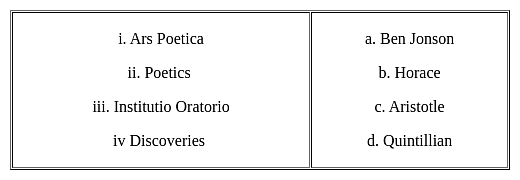TS SET Paper 2 Mock Test - 4 (English) - TS TET MCQ
30 Questions MCQ Test - TS SET Paper 2 Mock Test - 4 (English)
In Mahesh Dattani's play "Final Solutions," who is the central character whose journey serves as a metaphor for societal conflicts?
From among the following identify the two Indian English authors who received appreciation and encouragement from their British counterparts:
I. R. K. Narayan, Graham Greene
II. Nirad C. Chaudhuri, Evelyn Waugh
III. Mulk Raj Anand, E. M. Forster
IV. Raja Rao, Iris Murdoch
The right combination according to the code is
| 1 Crore+ students have signed up on EduRev. Have you? Download the App |
In The Rape of the Lock Pope repeatedly compares Belinda to
How many legends of good women could Chaucer complete in his The Legend of Good Women?
Match the following works with their authors:

The Bhasmasura myth is used in R. K. Narayan’s ________.
This influential critic :
I. wrote influential commentaries on such poets as Shelley, Black and Yeats.
II. published such titles as The Anxiety of Influence, A Map of Misreading, Poetry and Repression and The Western Canon.
III. asserted that most literary criticism is but slightly disguised religion and
IV. is, arguably, the most widely known and contrarian among his American peers in the English Academy. Identify the critic :
What does Rich imply when she says “The grammar turned and attacked me”?
In Geoffrey Chaucer’s Canterbury Tales, the pilgrims, like the medieval society of which they are a part, are made up of three social groups or “estates”. What are the three estates?
Identify the correctly matched set below :
Match the following poets with their respective poems



















